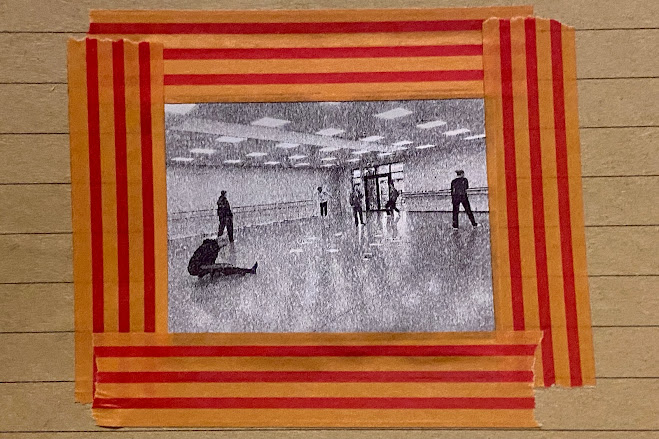8. to tell or not to tell
I was thinking around the framework of our meetings and something that Helen introduced in approaching the conversation as an improvisation with the same rules of the yes and game.
So maybe I will start focusing on this as it’s a common framework, and because I have an embodied understanding of it through exploration in the studio. I can try to look at some theories within it.
Firstly, my own theories that I bring to open improvisation can set the tone of what I’m searching for. If we decide that the purpose of yes and is to drive the material forward and to listen, then I have many questions to stretch and exist within this as a framework. These are things I’m searching for in my practice of dance improvisation in a group… but maybe they can also apply to conversation.
how can i say yes and whilst also saying:
- no absolutely not
- maybe but i’m not sure
- but what about this
- yes but i don’t know why
- no but i don’t know why
- this is not interesting to me
- i want to go somewhere else but i don’t know how to get there
- yes but why
- me too
can i drive forward whilst actually pulling us backwards, or sinking us downwards?
have i questioned why forwards is more interesting than other directions?
am i open to the possibility that i might have to go backwards or sideways to eventually get forwards?
am i always listening in the same ways?
what is the value of bad listening?
what is the chronology of listening?
have i forgotten to listen to myself?
where does our individual value systems become disruptive?
am I holding onto something because I don’t want to be disruptive?
who says this space can’t be disruptive?
And then to relate these theories to existing scholarship:
There is a breadth of beautiful theory around orientation in Ahmed’s Queer Phenomenology (2006) it looks at deviation and I also enjoy the question it poses ‘why call the personal a digression?’ Maybe with this as an identified theory I can look at any of my above thoughts on reorienting direction or questioning the accepted norms of the given task in relation to Queer Theory and how that informs my inquisitive mind.
There are also theories around improvisation - I want to give a specific quote from Burrows’ A Choreographers Handbook (2010) but also acknowledge the form of the book: Asking questions. Accepting multiple definitions. Holding contrasting beliefs. I think that this approach, in itself, is valuable to take as a theory for breaking down the concepts I am working with.
This freedom is also there, sometimes, in set forms: the freedom not to be responsible for making a choice, the freedom to deviate because I have something to deviate from.
(Burrows, 2010)
Deviating from the structured as theory. Multiplicity of definitions as theory.
In "Yes And": Exploring and Heightening the Positive Psychology in Improvisation (2020) Elam writes around the yes and form:
individual improv performer, an excellent improv teammate, and an excellent human. “Yes” is awareness, acceptance, and appreciation. “Yes” is “I am listening.” “Yes” is “Great idea, I can’t wait to play with you.” “And” is agency, autonomy, and action. “And” is building a story together. “And” is adding your own brick to the cathedral. As improvisers, our responsibility within a scene is to accept the reality our scene partner has established (“yes”) and to contribute by adding to that reality (“and”). Saying “yes” to your partner is how you acknowledge their contribution and accept it as true.
(Elam, 2020)
So this is also theory. I don’t necessarily agree with it. But it is a version of the theory of what I’m talking around. Elam does however go on to distinguish between disruption and disagreeing, so for instance you could play yes and with an argument scene, whereby you would agree on the situation even though you might come in saying no absolutely not. This is similar to my theory - where if we want to use yes and as a form but keep the possibilities wide open, we have to evaluate the potential of our agency in what we say yes to. So I could do the opposite of Elam’s example - I could say yes to the content and say no to the situation. Otherwise I make a statement saying: good improvisation is assuming the same situation as your partner, which I believe can be true - but should also be acknowledged as a taste and a choice.
And then we have theories around listening and theories around teamwork and theories about theories about the other things I’ve already discussed. Then we have the tacit and the ephemeral and theories which chase and try to give answers. Also theories which are just questions.
-
To Tell or Not to Tell - The Dick Van Dyke Show, Season 1, Episode 8




So many interesting points I don't know where to start! The "yes and" game in the context of saying yes to the content and no to the situation is such an interesting point. I haven't really thought about it in the way that you described, almost as a situation where zero autonomy is granted. It's interesting because I have always felt quite independent yet collaborative in this exercise, however the way in which you describe "have i questioned why forwards is more interesting than other directions?" is such a beautiful point that I haven't really considered. I am actually in an improv show next week and we have 6 shows alongside actors so it will be an interesting balance of dance and acting and I am going to sit in reflection about what you have brought up. So timely for me! Thank you.
ReplyDeleteI’m so happy it’s interesting for you! I’m also curious in the performance if you can easily meet the actors or whether you understand the fundamentals of listening and improvising differently. I feel like it’s these clashes and cross overs where some of the really interesting knowledge lies.
DeleteThis is so interesting to hear about. I am not at all familiar with this game actually, but it sounds fascinating. I find this post has actually moved my thought process slightly off topic and made me consider the times when we say yes because we feel we should, when in fact we really want to say something else. In the dance environment this happens a great deal I find, when people are afraid to speak up if something is not right in fear of losing their jobs or roles.
ReplyDeleteAnn you make me so happy sharing this because it's so so true! And I guess it it comes into when a framework(!) isn't established with sufficient care within structured work environments. Saying no actually becomes a privilege, or at least an action that sometimes only the privileged can afford to take.
Delete